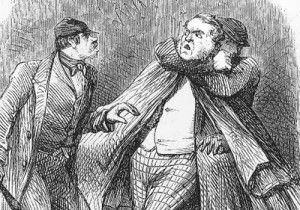Rutten's Amazon Attack Ignores Reality
By JOHN SEILER
L.A. Times columnist Tim Rutten continues his tax obsession in “Amazon’s shameful California tax dodge.” He just has it in for Amazon.com. He makes a weird comparison:
At the turn of the last century, as the robber barons’ first gilded age lingered on, many Californians came to regard one powerful enterprise as the symbol of oppressive avarice and of big money’s corrupt appropriation of the political process.
That company was the Southern Pacific, whose railways kept a stranglehold on commerce and whose operatives dominated state government. The firm’s malevolent influence was the inspiration for one of California’s first literary classics, Frank Norris’ “The Octopus,” which — along with Upton Sinclair’s “The Jungle” — helped usher in a period of progressive reforms.
Rutten ends his screed:
If Jeff Bezos, Amazon’s founder and chief executive, has a spare moment there in Seattle, he might go on his website and buy a copy of Norris’ “The Octopus.” (As a resident of Washington state, he’ll have to pay sales tax.) In any event, he might skip to the end of the first chapter and consider how it might feel to have Amazon regarded as the poet-narrator describes the Southern Pacific:
“The leviathan, with tentacles of steel clutching into the soil, the soulless Force, the iron-hearted Power, the monster, the Colossus, the Octopus.”
It’s a happy day when a columnist can show off his literary acumen. But as a journalist, he also should have done some research. Back before the Internet, research was difficult. You had to walk over to the newspaper library, find a reference book, such as one listing the top U.S. retailers, and Xerox the page.
Nowadays, things are much easier. It took less than a minute for me to Google “top retailers” and get this page.
It lists Amazon, for 2010, as the 19th biggest retailer in the USA, with $18.5 billion in sales. The biggest — no surprise — was Wal-Mart, at $307.7 billion.
So, Amazon.com’s sales are 1/17th those of Wal-Mart. If there’s an “Octopus” here, it obviously is Wal-Mart.
No doubt Amazon has sold more so far in 2011. It grew 40 percent in 2010, and probably is growing that fast this year. But it still would enjoy but a fraction of Wal-Mart’s sales.
The Biggest Octopus
Moreover, there are a lot bigger octopodes that even Wal-Mart. A century ago, governments still were pretty small. Americans lived in freedom.
Today, just for California, Amazon sold about $2 billion in 2010. California’s state budget now is $86 billion, or 43 times as big.
And as to Amazon’s $19.5 billion in U.S. sales last year, the U.S. federal budget now is $4 trillion — 205 times as big.
Rutten is upset that Amazon is using the initiative process, created a century ago by the progressives who battled Southern Pacific, to thwart the recent Amazon tax. (The tax actually hits 25,000 small “affiliates” a lot more than it does Amazon because Amazon and other companies fired their affiliates.) But until now, Amazon has had close to zero political involvement in California. It’s only involved because it was attacked by Rutten and crew.
Wal-Mart and Property Rights
By contrast, Wal-Mart long has been deeply involved in California politics. As a reporter, Rutten should know that.
I’ve written about Wal-Mart’s actions for years, especially during my 19 years as an editorial writer at The Orange County Register. Sometimes I have defended Wal-Mart, as when unions have thwarted its expansion plans because the company mostly is non-union.
But I’ve also attacked Wal-Mart when it has used its immense powers to manipulate local governments to abuse eminent domain and other political tricks to its advantage. My principle is simple: the same property rights for everybody. Wal-Mart should not use its clout to trample on the little guys’ property rights. But powerful unions shouldn’t revoke Wal-Mart’s property rights.
Rutten also is upset that federal laws and court decisions prevent sales taxes being grabbed across state lines, unless a company has a “nexus” — a physical location — in the taxing state. He says this means California loses $2 billion in tax revenue a year.
The number is dubious because, if inter-state sales taxation were allowed in the United States, then shipments from California to other states would be taxed more often, reducing the sales of our companies. But Rutten thinks statically, not dynamically. He’s living in a 1993, pre-Internet world.
Commerce Clause
But he should have noted that the law and court decisions are firmly grounded in the “Commerce Clause” of the U.S. Constitution, which was designed to prevent the states from erecting protectionist borders against each other. The Founding Fathers saw how Europe’s numerous small states attacked one another with protectionist barriers, and wanted to prevent similar battles here. That’s one part of the Constitution that has worked well, and has been a foundation of our national prosperity.
He also should have noted that, with Republicans in charge of the U.S. House of Representatives until at least 2015, there’s no chance they would pass a law allowing inter-state taxing of sales. And even Democrats, when they ran all of Congress from 2007-2010, didn’t dare allow that tax increase.
Moreover, the five states with no sales tax are represented in the U.S. Senate by eight Democrats and just two Republicans. Those eight Democrats — including Sen. Max Baucas of Montana, chairman of the powerful Senate Finance Committee — would join with all 47 Republicans in the Senate to block any change in tax law that could potentially slam their states.
As to the Amazon initiative here in California, it’s not a sure thing anyway — something “Octopus” Rutten should have pointed out. Two-thirds of initiatives fail. Powerful opponents of an Amazon initiative would include Wal-Mart and other major retailers, the L.A. Times and other liberal newspapers and the state’s powerful government-worker unions — always salivating like Pavlov’s dog for more of our tax money.
On Amazon’s side is its good image and the convenient service it has provided to millions of Californians, anti-tax groups, the vast majority of those 25,000 fired affiliates who would want their livelihoods back — as well as the negative image voters have of Gov. Jerry “Jobs Killer” Brown, the greedy unions, the state Legislature and government in general.
Voters — over-taxed, over-regulated and under-employed — are in a foul mood. They’re starting to understand that government, the real deadly octopus, is not their friend, but their enemy. And that raising taxes only feeds the octopus.
Finally, Rutten says Bezos should go to the Amazon.com site and buy a copy of “The Octopus”: “As a resident of Washington state, he’ll have to pay sales tax.” That’s more defective research. Amazon.com offers a free copy, on which no sales tax is charged anywhere — for now.
Related Articles
Gerawan workers protest UFW as court date looms
A fresh twist has arisen in the drama surrounding Gerawan Farms’ dispute with United Farm Workers. The long-running controversy, which pitted
Deasy resignation continues LAUSD turmoil
John Deasy’s recent resignation as the superintendent of the Los Angeles Unified School District ends three years of controversy. But a
AB 32 Turning Into Pollution Pork
JUNE 13, 2011 By WAYNE LUSVARDI Call it “pollution pork.” Gov. Arnold Schwarzenegger has been gone only five months and





